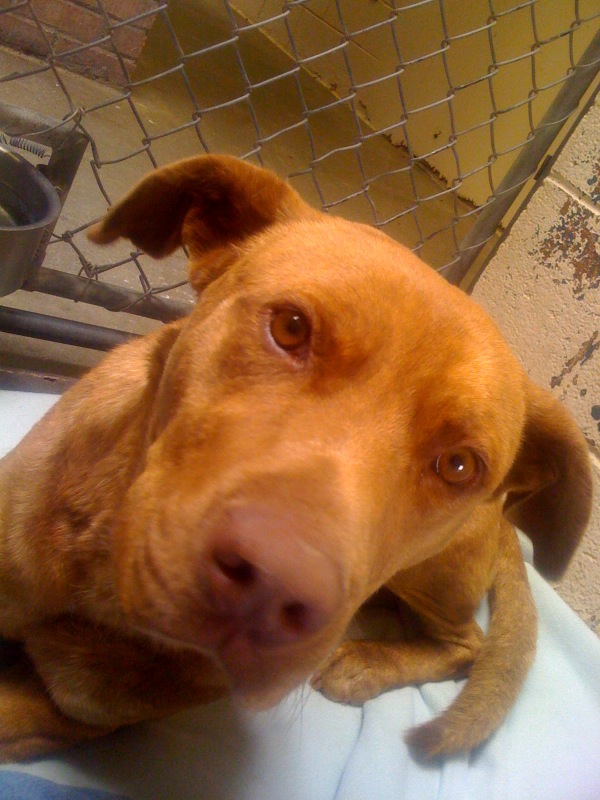A few years ago, at the shelter in San Francisco, I spotted a fellow volunteer slumped awkwardly against a wall. He looked pale and dazed and I could just make out the beads of sweat forming at his temples. “Are you okay?” I asked.
“Yeah,” he said and held up a bulging poop bag. “Some days you can deal with the odor better than others. For some reason, it really got to me today.” With that, he regained his composure and headed for the trash bins.
Not a particularly profound observation, but the same is true for the emotional crap. Some days you can deal with the painful reality of shelter life. Other days, it stabs you in the heart and there’s no way to avoid flinching.
At the shelter yesterday (in Espanola, near where I live now), the pain came on suddenly, unexpectedly, and with unstoppable current. I’d become very attached to a recent intake — a big red Pit Bull who doesn’t have much use of his left front leg. His elbow was dislocated (or broken? I can’t remember which) and was never treated or reset. I’m not sure how much pain it still gives him, and our staff veterinarian makes sure he’s comfortable, but he hobbles around without walking on it.
I’d taken to lying down with the dog in his kennel, as much as we both could fit, on a folded blanket. He would nuzzle in close and I’d pet his belly and scratch his ears and chest. Every so often, he’d sort of exaggeratedly hoist his gimpy leg from the shoulder and flip it over my direction. It was the closest he could come to resting a paw on my arm.
Thanks to a less than perfect behavioral history, I was afraid that yesterday might be the last time I’d see him. Fortunately, at the Espanola shelter, breed and history are not an automatic death sentence. Every dog is assessed as an individual, each one’s potential to become a safe and healthy family dog is evaluated.
Still, with intake numbers at staggering levels and no sign of a slow down, I knew that nothing was guaranteed. And I just lost it. I didn’t simply get a bit teary-eyed, I underwent one of my patented Leslie Smith meltdowns: quivery lip, audible sniffles, choking sobs — the works. The shelter behaviorist comforted me as best she could, and I as I wiped my face with my sleeve, I thanked her in broken, lamb-y voiced grunts.
Because my timing is impeccable, I staggered toward the exit, still weepy, as the kennel manager led a New Volunteer Orientation tour. “Here’s one of our happy volunteers now!” she might’ve said had she not seen my face in time. The group looked uncomfortably away as I ducked out the door. (The kennel manager, by the way, called me at home later to make sure I was ok. Not at all irritated that I’d potentially off-roaded her orientation — just concerned that I was ok. Those are the kind of people who run the place.)
To shelter administrators I’d been referring to the dog as the Red Pit in 22 (his kennel number). At home though, Mike and I call him Big Red. “I’m sorry it was so tough with Big Red today,” he said as I tried to explain what triggered all the tears. “Nothing out of the ordinary,” I told him. Some days the stench is just stronger than others.
As for Big Red, his fate is still unwritten.




